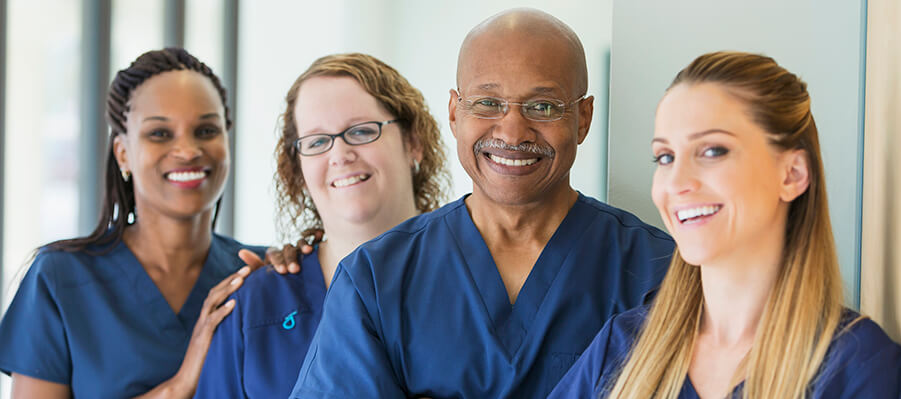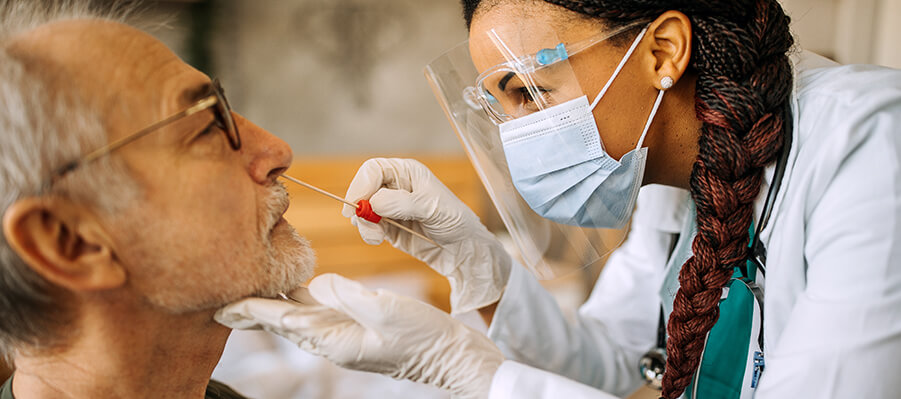Honoring nurses across health and human services
May 6–12, 2021, is Nurses Week. CARF recognizes the profound impact the nursing field has across health and human services.
Now, as much as ever, it’s so important to honor the powerful, positive impact the nursing profession has had on health and human services. Nurses play a crucial role in delivering needed care across every area of CARF accreditation. We deeply value their courageous work. This Nurses Week, CARF wishes to recognize all the nurses in our surveyor cadre and those working in our accredited programs. We reached out to a number of nurses in our family of accredited organizations. Below are their insights on the nursing profession.
Q: Briefly describe your career in the nursing field. How did you get started? What motivated you?
I wanted to be a nurse from the time I was 8 years old. Hearing people’s stories and learning about them was a huge motivation for me. I started out working for the VA in The Bronx. My dad served in the Army, so that was important to me. I have been a civil servant my entire career. Serving the public provides meaning for me.
—Opioid Treatment Program Surveyor Anjanette DeVito, M.S.N., B.S.N., RN, Nurse Manager,
Santa Clara Valley Health and Hospital System, San Jose, CA
I knew I wanted to be a nurse when I was 5 years old after interacting with an ER nurse who was treating me for an injury. I began my career as a community health nurse after graduating from my undergraduate nursing program. I received a master’s degree in psychiatric/mental health nursing. I then was recruited to supervising nurse at my agency and eventually worked my way up with increasing responsibilities until I became president and CEO.
—Employment and Community Services Surveyor Diane McCall, M.S., RN, President Emeritus, Wayne Center, Detroit, MI
I always wanted to be a nurse, even as a little girl! I started my career in a provincial hospital for mental health clients, as it was not possible to find a position in a general hospital in Ontario in 1974. Although I had an interest in working with patients seeking psychiatric care, it was not my original desire. I hoped to work in obstetrics, but my experience working in a psychiatric facility completely changed my focus. I loved the opportunity and refocused my practice on psychiatry.
—Surveyor Jill Bloom, RN, CPRP, Director of Mental Health and Addiction Services (retired), Langley, BC;
(Jill surveys for the Employment and Community Services, Behavioral Health,
and Child and Youth Services customer service units).
I had a family friend and family member who were nurses, and I thought their careers were so interesting and rewarding.
—Medical Rehabilitation Surveyor Paula Martinkewiz, M.S., RN, CRRN, Senior Consultant,
Operations and Clinical Support Services, Integrated Rehab Solutions, Argyle, TX
I started as a staff nurse on a 45-bed inpatient rehabilitation facility, moved to manager of that unit, then to director of rehabilitation services, and now I do consulting.
—Medical Rehabilitation Surveyor Carolyn Walton, M.S., B.S.N., RN, CRRN, FACHE, Director, BRB Consulting, Media, PA
I have worked in various nursing fields from geriatrics, prison, youth services, and community health. I liked playing nurse/doctor when I was a child, and my motivation came from taking care of my brother while we were growing up. He was born with cerebral palsy.
—Opioid Treatment Program Surveyor Sara Mihlfeld, LPN, Vice President,
Medication Assisted Treatment Services, Meridian Behavioral Healthcare, Gainesville, FL
I was influenced by my mother, who was an RN. I started volunteering at my mother’s hospital at age 12; worked as a nursing assistant; went to school for my associate degree in nursing (ADN); and moved to Galveston, Texas, to work and get my bachelor’s (B.S.N) and then master’s degrees (M.S.N.) at University of Texas Medical Branch (UTMB). I started working as a case manager in acute rehabilitation, and then shifted to a nurse manager role. This year, I completed my doctorate of nursing practice (D.N.P.) at Grand Canyon University while working as a clinical educator at Kaiser Foundation Rehabilitation Center. I have been a program surveyor at CARF for the past 15 years. I have been blessed beyond measure throughout my nursing career.
—Medical Rehabilitation Surveyor Gail Sims, D.N.P., M.S.N., RN, CRRN, Clinical Educator,
Kaiser Foundation Rehabilitation Center, Vallejo, CA
I began my nursing career as a licensed practical nurse (LPN) and worked my way through my ADN, B.S.N., and M.S.N. I have had a vast array of nursing experiences, working in medical; long-term care; residential rehabilitation; and inpatient, outpatient, and community-based mental health settings. My mother was a nursing assistant and inspired me to go into the field.
—Martha Wood, Associate Chief Nurse, Mental Health, Tuscaloosa VA Medical Center, Tuscaloosa, AL
I wanted to be a nurse when I was 5 years old. My goal was to work at Shriner’s. That didn’t happen, but I was introduced to rehabilitation when my dad worked at Rancho Los Amigos, when people were still in iron lungs. I started as a candy striper at the age of 15, and my first job in rehabilitation was at the Rancho spinal cord unit while I was still in school. I loved being involved with helping patients gain independence, working with them and their families. I worked in multiple settings, but when I returned to rehabilitation in 1976, I felt like I had come home.
—Medical Rehabilitation Surveyor Donna Williams, M.S.N., RN, CRRN, Rehabilitation Nurse Case Manager,
Kaiser Foundation Rehabilitation Center, Vallejo, CA
Q: What was it like to be a nurse when you began your career?
Nursing 30 years ago was hard! Preceptors expected that new grads knew everything! They were not at all patient or kind. These experiences provided direction as to what kind of preceptor and manager I wanted to be. —Anjanette
It was very hands on. There were no computers or electronic thermometers or blood pressure equipment. —Carolyn
I started out working in geriatrics. Nursing seemed more personal in the 1970s. I developed relationships with my patients and their families. —Sara
Nursing was both an art and a science in the 1970s, although we did things without examining the evidence in the literature. We based our practice on what was taught in nursing school, which was based on a few textbooks. We did not challenge the instructors, our managers, or the physicians. Looking back, we did things that were later proven to be ineffective, but we did not know a better way. Without much technology, we worked very hard to carry out the plan of care. We carried our paper “cheat sheets” on clipboards or in our pockets and stayed after to document the events on our shift. Most nurses worked full time, and many picked up overtime or had second jobs. In some ways, we had better continuity because we worked full time. —Gail
We stood when the doctor came into the room. Patients were on bedrest in hard casts for months after spinal surgery. Fractures were immobilized with traction. Strokes were for the older population. We did a lot of bedside care. The philosophy of mobilization for better outcomes was just starting. —Donna
As nurses, we were very poorly paid and expected to blindly follow orders, but that all changed within the first five years of my career, as the government and unions recognized the need to pay nurses a living wage for the work that we did. The practice of nursing became more valued as a profession. —Jill
When I began my career in an intensive care unit (ICU) at a very busy county hospital, we didn’t even have 24-hour coverage by ER physicians. Our attending physicians worked and were on call 24 hours a day. This practice empowered nurses to be top notch and ready to address any and all issues with the help of attending physicians who were often on the phone. It wasn’t too long after I started that we got our first 24-hour ER physician who would cover the ICU and any emergency that was happening on the hospital. Times have certainly changed. —Paula
Q: How has the COVID-19 pandemic changed your job or your role/responsibilities?
The pandemic has made things challenging, but working for a public institution has allowed my organization to continue to provide services, with small modifications; e.g., testing, masks. —Anjanette
I’ve had a lot of telehealth meetings, and much less person-to-person contact. —Sara
We had to adapt. As a clinical educator, I cross-trained medical/surgery and telemetry nurses to work in the ICU, rehabilitation nurses were refreshed on medical/surgery, and non-clinical nurses in quality and management were oriented to tasks that could be conducted on the units during the surge in admissions. I assumed the role of my direct supervisor, as he was working in the command center. During this period, I was completing my D.N.P.. I continued with school throughout the pandemic. —Gail
While this pandemic rages, people are still sustaining spinal cord injuries, strokes, traumatic brain injuries, and other illnesses. The challenge has been getting services for these patients as well as those post-COVID while dealing with diminished capacity and other hospitals transferring their patients to our unit. The pandemic has increased the need to work as a team, both within our own facility as well as the facilities that refer to us. —Donna
The COVID-19 pandemic has been unlike anything I have experienced in my nursing career of more than 35 years. It has been a challenge, but it has also shown me that nurses are courageous and able to adjust/adapt to just about any situation. The use of telehealth has been invaluable during this time. —Martha
Q: How has nursing changed over your time in the field?
In so many ways…from how medications are delivered and dispensed both in hospital and in clinic to how we document. —Anjanette
The profession has grown to be highly respected and specialized. As a new RN in the 1970s, we were “Jills of all trades,” wearing many hats, but that changed with the introduction of aides and other valued members of the team such as restorative nursing assistants (RNAs) and licensed practical nurses (LPNs) in the field. —Jill
Nursing is less hands on and more task oriented by electronic methods. There is more knowledge to attain. —Carolyn
There have been many advancements with medication assisted treatment, which gives patients more options. —Sara
Nursing tasks are much easier to complete due to technology. The equipment talks you through each step. Nursing ratios have made it incredibly easier. In the 1970s, we cared for a telemetry unit of 24 patients with 1 RN, 1 licensed vocational nurse, and 2 nursing assistants. In California, the ratio is 5 patients for each RN with nursing assistants and unit assistants. Charting is much simpler in an electronic medical record. Evidence-informed practice helps us learn from the research and build on previous studies. Whenever there are new procedures, equipment, and techniques for providing patient care, we search the literature at our fingertips to ensure that we are providing care with the most up-to-date practices. —Gail
Nursing has changed a lot in the past 35 years. One important change is the use of technology to provide care. The use of telemedicine has allowed care to be provided to patients that would have never been able to receive it. —Martha
Nurses have become more independent, more valued as part of a team. We are speaking up more and taking on more roles. When I started, nurses were mostly in the hospital or in home health. Now we are everywhere, owners of our own businesses, directors, educators, and researchers. PhD nurses were rare. Now advanced degrees are encouraged. Rehabilitation nursing as a specialty was a very new concept. Now, we are involved in encouraging rehabilitation nursing worldwide. —Donna
Q: If you could give a piece of advice to someone considering a career in nursing, what would you tell that person?
Be patient with yourself as you continue to learn and practice. There will be challenging days, but there will also be rewarding ones. —Anjanette
Get your basic degree in nursing and then explore the different specialty areas until you find the one that best matches your interests. —Diane
It is a highly respected profession that cannot be taken away from you, as there is always a need for nurses across all areas of healthcare. The opportunities are endless with what you can do with a degree in nursing. —Jill
Nursing offers a complete array of focus areas much different from other professions. You can work at different levels of care, with different age groups, academics, insurance and case management, school, etc. There are varying roles and responsibilities during different shifts or working hours. It’s very flexible. —Paula
Nurses enter the field because it is their passion, not to have a job. Remember, there are many avenues to take in nursing.
—Carolyn
I encourage people to follow their heart. Nursing is a wonderful career, if you are called into the profession. There are so many avenues to pursue and many specialties within nursing. I consider nursing a ministry, in which we have the opportunity to serve others in such meaningful ways. It is important to achieve the highest degree of education possible and remember we are all lifelong learners. —Gail
Nursing is a wonderful career that can take you in so many directions. The possibilities are endless. My top three pieces of advice: Stay humble, work hard, and be kind! —Martha
Do it! I would do it all over again, even the parts I didn’t like (it was tough serving in the newborn ICU) because of all I have learned and all those I have interacted with over the years. Nursing has made me who I am today. —Donna
CARF wishes a “Happy Nurses Week” to all those who have served or are currently serving in the nursing field. We wish to thank those CARF surveyors and staff members of accredited programs who contributed to this article as well as all nurses across the health and human services field.



